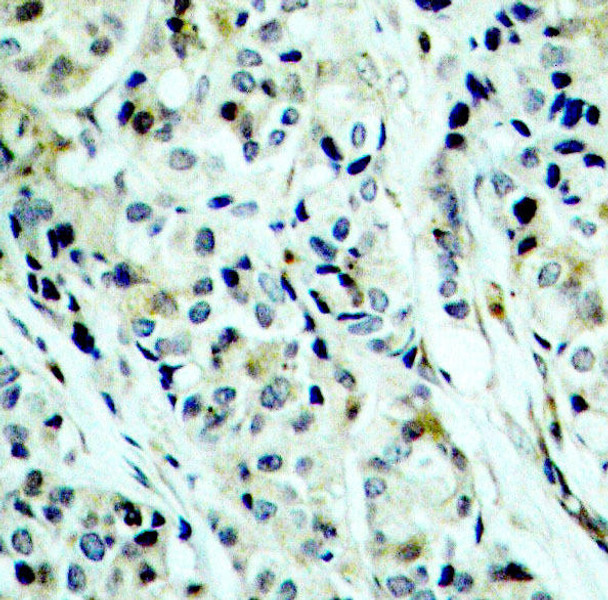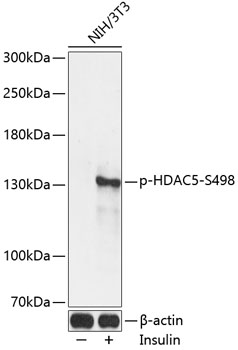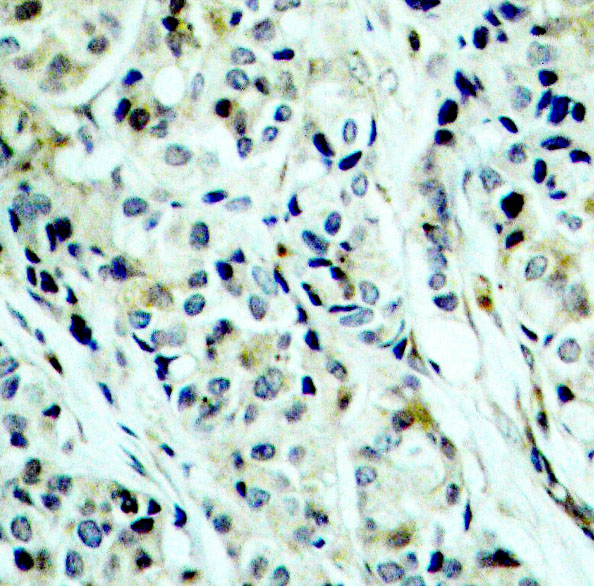Anti-Phospho-HDAC5-S498 Antibody (CABP0202)
- SKU:
- CABP0202
- Product type:
- Antibody
- Application:
- WB
- Application:
- IHC
- Reactivity:
- Human
- Reactivity:
- Mouse
- Reactivity:
- Rat
- Host Species:
- Rabbit
- Isotype:
- IgG
- Research Area:
- Epigenetics and Nuclear Signaling
Description
| 抗体名: | Anti-Phospho-HDAC5-S498 Antibody |
| 抗体コード: | CABP0202 |
| 抗体サイズ: | 20uL, 50uL, 100uL |
| 申し込み: | WB IHC |
| 反応性: | Human, Mouse, Rat |
| 宿主種: | Rabbit |
| 免疫原: | A phospho specific peptide corresponding to residues surrounding S498 of human HDAC5 |
| 申し込み: | WB IHC |
| 推奨希釈: | WB 1:500 - 1:2000 IHC 1:50 - 1:100 |
| 反応性: | Human, Mouse, Rat |
| ポジティブサンプル: | NIH/3T3, NIH/3T3+Insulin |
| 免疫原: | A phospho specific peptide corresponding to residues surrounding S498 of human HDAC5 |
| 精製方法: | Affinity purification |
| ストレージバッファ: | Store at -20°C. Avoid freeze / thaw cycles. Buffer: PBS with 0.02% sodium azide, 50% glycerol, pH7.3. |
| アイソタイプ: | IgG |
| 順序: | Email for sequence |
| 遺伝子ID: | 10014 |
| Uniprot: | Q9UQL6 |
| セルラーロケーション: | Cytoplasm, Nucleus |
| 計算された分子量: | 112kDa/121kDa/122kDa |
| 観察された分子量: | 140kDa |
| 同義語: | HDAC5, HD5, NY-CO-9 |
| バックグラウンド: | Histones play a critical role in transcriptional regulation, cell cycle progression, and developmental events. Histone acetylation/deacetylation alters chromosome structure and affects transcription factor access to DNA. The protein encoded by this gene belongs to the class II histone deacetylase/acuc/apha family. It possesses histone deacetylase activity and represses transcription when tethered to a promoter. It coimmunoprecipitates only with HDAC3 family member and might form multicomplex proteins. It also interacts with myocyte enhancer factor-2 (MEF2) proteins, resulting in repression of MEF2-dependent genes. This gene is thought to be associated with colon cancer. Two transcript variants encoding different isoforms have been found for this gene. |
| UniProt Protein Function: | HDAC5: a transcriptional regulator of the histone deacetylase family, subfamily 2. Deacetylates lysine residues on the N-terminal part of the core histones H2A, H2B, H3 AND H4. Plays an important role in transcriptional regulation, cell cycle progression and developmental events. Coimmunoprecipitates only with HDAC3 family members. Interacts with myocyte enhancer factor-2 (MEF2) proteins, resulting in repression of MEF2-dependent genes. Two alternatively spliced isoforms have been described. |
| UniProt Protein Details: | Protein type:EC 3.5.1.98; Hydrolase Chromosomal Location of Human Ortholog: 17q21 Cellular Component: nucleoplasm; Golgi apparatus; nuclear body; cytoplasm; histone deacetylase complex; nucleus; cytosol Molecular Function:protein binding; NAD-dependent histone deacetylase activity (H3-K9 specific); protein kinase C binding; NAD-dependent histone deacetylase activity (H3-K14 specific); metal ion binding; histone deacetylase binding; protein deacetylase activity; NAD-dependent histone deacetylase activity (H4-K16 specific); histone deacetylase activity; transcription factor binding; transcription corepressor activity Biological Process: response to drug; regulation of skeletal muscle fiber development; establishment and/or maintenance of chromatin architecture; Notch signaling pathway; transcription, DNA-dependent; B cell activation; heart development; chromatin silencing; histone deacetylation; chromatin modification; negative regulation of transcription from RNA polymerase II promoter; response to cocaine; regulation of gene expression, epigenetic; osteoblast development; chromatin remodeling; cellular response to insulin stimulus; protein amino acid deacetylation; B cell differentiation; regulation of protein binding; positive regulation of transcription factor activity; negative regulation of osteoblast differentiation; positive regulation of transcription from RNA polymerase II promoter; inflammatory response; negative regulation of transcription, DNA-dependent; multicellular organismal response to stress |
| NCBI Summary: | Histones play a critical role in transcriptional regulation, cell cycle progression, and developmental events. Histone acetylation/deacetylation alters chromosome structure and affects transcription factor access to DNA. The protein encoded by this gene belongs to the class II histone deacetylase/acuc/apha family. It possesses histone deacetylase activity and represses transcription when tethered to a promoter. It coimmunoprecipitates only with HDAC3 family member and might form multicomplex proteins. It also interacts with myocyte enhancer factor-2 (MEF2) proteins, resulting in repression of MEF2-dependent genes. This gene is thought to be associated with colon cancer. Two transcript variants encoding different isoforms have been found for this gene. [provided by RefSeq, Jul 2008] |
| UniProt Code: | Q9UQL6 |
| NCBI GenInfo Identifier: | 296434519 |
| NCBI Gene ID: | 10014 |
| NCBI Accession: | Q9UQL6.2 |
| UniProt Secondary Accession: | Q9UQL6,O60340, O60528, Q96DY4, C9JFV9, |
| UniProt Related Accession: | Q9UQL6 |
| Molecular Weight: | 1122 |
| NCBI Full Name: | Histone deacetylase 5 |
| NCBI Synonym Full Names: | histone deacetylase 5 |
| NCBI Official Symbol: | HDAC5 |
| NCBI Official Synonym Symbols: | HD5; NY-CO-9 |
| NCBI Protein Information: | histone deacetylase 5; antigen NY-CO-9 |
| UniProt Protein Name: | Histone deacetylase 5 |
| UniProt Synonym Protein Names: | Antigen NY-CO-9 |
| UniProt Gene Name: | HDAC5 |
| UniProt Entry Name: | HDAC5_HUMAN |



